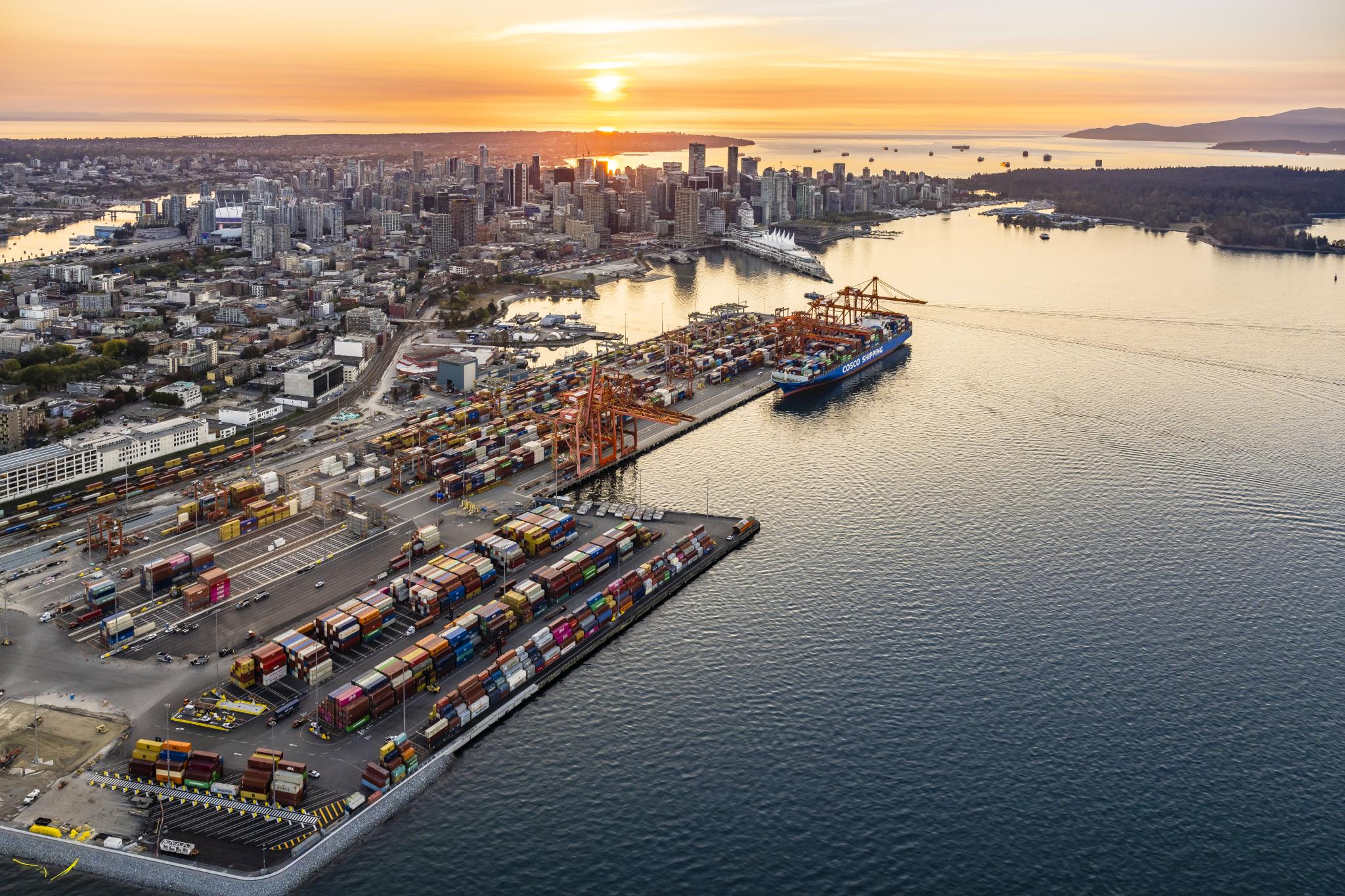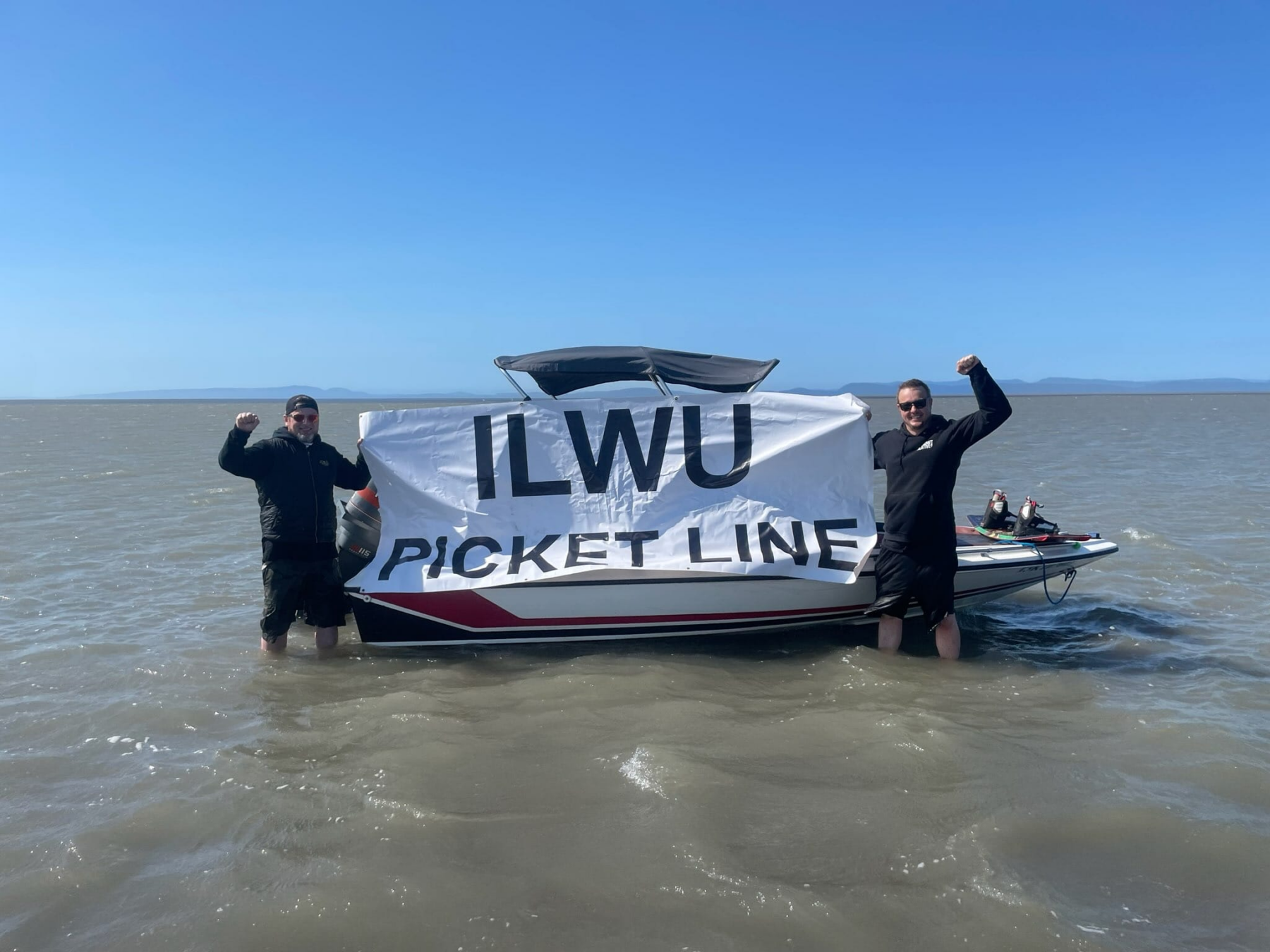Port strike reaches major roadblock in Western Canada
Negotiations between port workers and the employers association so far have stalled.

The sun sets over the Port of Vancouver. – Port of Vancouver
Key Takeaways:
- Several days into the strike, both parties have accused the other of being unreasonable and negotiations appear to have stalled.
- Automation of ports, the rising cost of living and the use of outside contractors are major issues that have been raised by workers.
- The employers association argued the union is trying to expand their scope and redefine their work.
- The strike includes more than 7,000 workers and impacts West Coast ports, including Canada’s largest port, the Port of Vancouver.
The Whole Story:
A supply chain crisis is brewing in Western Canada as workers at some of Canada’s largest ports are striking.
On July 1, more than 7,000 International Longshore and Warehouse Union Canada (ILWU Canada) workers walked off the job after negotiations with the BC Maritime Employers Association (BCMEA) failed to produce a new collective agreement. Days later, the two parties seem no closer to a solution.
What the employers say
On Monday BCMEA announced that a continuation of bargaining at this time is not going to produce a collective agreement.
“The BCMEA has continued to advance reasonable proposals and positions in good faith with the urgent objective of making progress, reaching a fair deal, and ensuring ports are open and supply chains are stable and reliable,” officials said. “Rather than work towards an equitable deal, ILWU Canada seems to have entrenched their positions. The BCMEA has gone as far as possible on core issues.”
The group stated that the ILWU Canada is attempting to “aggressively expand” their scope and re-define regular maintenance work far beyond what is set out in the industry-wide agreement. The BCMEA’s view is that changing this definition would result in immediate and significant impacts to terminal operations. They explained that under the current collective agreement, the ILWU exclusively supplies the labour force, however, the employers noted that the union has been consistently unable to fulfill the trades work they have jurisdiction over.
“Further, ILWU Canada’s proposals for compensation are unreasonable, and well outside the established norm of union settlements in Canada,” they said.
In 2022, the median salary of an ILWU Union longshore worker in B.C. was $136,000 per year, plus benefits and pension. Over the course of the past 13 years, longshore wages have risen by 40%. ILWU Canada member wages have increased by approximately 10% in the past three years since the COVID-19 pandemic began.
“ILWU Canada went on strike over demands that were and continue to be outside any reasonable framework for settlement,” said the BCMEA. “ILWU Canada needs to decide if they are going to continue this strike with no hope of settlement, or significantly modify their position so a fair and balanced deal can be reached.”

What the union says
When the union issued its strike noticed, it cited three main objectives:
- Stop the erosion of their work through contracting out.
- Protect current and future generations from the impacts of port automation.
- Protect longshore workers from record high Inflation and sky-rocketing cost of living.
According to the union, the association was not willing to engage in any meaningful way on substantive issues based on their experience with how the the BCMEA approaches collective bargaining. In response, the union issued notice of dispute in an effort to move the process along and parties have been involved with the Federal Mediation and Conciliation Services (FMCS) since April.
The union replied to the association’s argument of them trying to expand its scope of work beyond regular maintenance.
“The fact is that the union has been raising the issue of rampant contracting out of our maintenance work for years,” said ILWU officials. “Our focus in this round of bargaining has been to stop the erosion of jurisdiction and the extensive use of contractors.”
According to the union, they moved substantially from their original position on regular maintenance issues and the parties had produced a document that was largely agreed upon. They accused the employers of changing their position at this late stage to “muddy the water” and mischaracterize the union’s concerns.
“The BCMEA drew a line in the sand and ended the progress that had been made so that the new maintenance document would have no ability to achieve the aims set out in it,” stated union officials. “The association deliberately sabotaged the progress that had been made therefore we must question their motives and the appropriateness of the BCMEA bargaining committee to actually negotiate a collective bargaining agreement.”
The unions also argued against the employers’ position on compensation, noting that the BCMEA’s members have enjoyed record profits before and during the COVID-19 pandemic and other industries, like the transportation sector, have shared those profits with workers.
“We implore the BCMEA to get back to the table to achieve a fair and reasonable agreement that the parties negotiate together,” stated the union. “It is unrealistic to think that a collective agreement that is imposed will result in long term labour stability in the industry. The parties need to put their best effort forward for the entire country and not just their individual aims.”
Automating port facilities
The automation effort the union is referring to is the the $3.5-billion Roberts Bank Terminal 2 Project which received federal approval earlier this year. The work, to be funded by the port authority and private investment, involves the construction of a new three-berth marine container terminal in Delta, B.C. The terminal will serve container ships bringing a wide variety of goods such as clothing, electronics, food, auto parts, manufacturing parts, furniture, and household goods.
The terminal will also serve overseas markets, shipping export containers loaded with a range of Canadian goods including pulp, lumber, crops such as lentils and legumes, grain, fruits, and specialty items like wine and craft beer. As part of the project, the existing causeway will be widened to accommodate additional road and rail infrastructure, and the existing tug basin will be expanded to accommodate a second tug operations
When it comes to automation, port officials stated that the future terminal operator will determine the final configuration and operating concept for the terminal, taking into account the conditions and commitments set out in the environmental process.
“However, it is important to note that all the work we have completed to date has planned for a semi-automated terminal and we assume the Roberts Bank Terminal 2 Project will be partially automated, similar to newer container terminals around the world,” they said.
The Canadian Chamber of Commerce urged the Government of Canada to immediately intervene in order to prevent further disruption to Canada’s supply chains and limit the impact of the strike.
“The government should immediately recall Parliament to pass back-to-work legislation to protect the livelihoods of Canadian workers and the health of Canadian businesses affected by disruption to the more than $800 million worth of cargo flowing through West Coast ports every single day,” said Robin Guy, vice president and deputy leader of government relations for the chamber.

